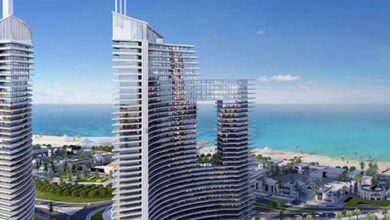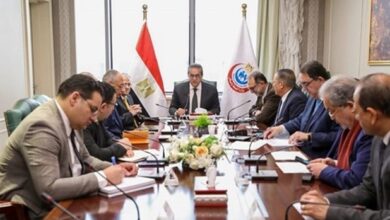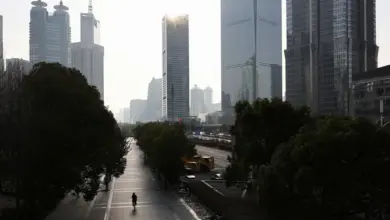There are numerous problems facing Egypt’s economy these days: high rates of unemployment and inflation, a growing national debt and shrinking tourism revenues. One of the biggest, though, is the threat of fleeing foreign investment. The Egyptian economy heavily relies on foreign investment, with almost US$7 billion in annual inflows.
Al-Masry Al-Youm recently met with Dave Robinson, the CEO for the Middle East, Turkey and Africa with Hill & Knowlton, a global communications consulting firm, to learn what he thinks it will take to sell post-Mubarak Egypt to foreign investors.
Al-Masry Al-Youm: Some people say that it would have been better for stability, in terms of investors and the economy, if Mubarak stayed until September. Do you share this opinion?
Dave Robinson: Investment cycles vary from a matter of days and hours, even sometimes to weeks, months and years. So when you know there is going to be change, whether it will be tomorrow or in six months, you still know there is going to be change. Any concerns or hesitance you have are still going to be in play. I think whether he stayed or didn’t stay until September is academic: He didn’t stay, we have a situation of an interim government, we are going to have elections, people will be watching and looking to see the outcome of those elections and, to a large degree, their decisions will be made partly on the nature and outcome of those elections. The new reality will be set and they will make the decisions accordingly.
Al-Masry: Egypt incurred big economic losses during the uprising. Some experts say more than US$30 million were lost each day. What kind of image does Egypt need to present in the short- and medium-terms in order to prevent an economic collapse?
Robinson: The important thing in any crisis situation is not to overreact or underreact. The situation is clearly significant and I think truth is always the best solution in any economic crisis situation. The reality is that Egypt is a large economy; it has a very large work force. Also, there are very good, compelling investment opportunities in Egypt. There are also clearly some infrastructure problems and some policy problems in terms of capturing those opportunities and working on them.
So for the government – current, interim or future – the challenge would be to communicate more effectively what the government is doing to build on the opportunities in Egypt, to communicate that clearly and effectively to audiences and stakeholders and to communicate it in a truthful, accurate way that makes sense – one of which is particularly hard to do, but it requires rigorous planning and very clear focus and targeting.
Al-Masry: How would you pitch Egypt to investors?
Robinson: There are many compelling opportunities in Egypt, some of which are geography, logistics, a large work force (skilled and unskilled), fairly cheap or cost-effective labor compared to many other countries and some particular industries where Egypt has deep experience. The IT industry is one of them.
Al-Masry: How can Egypt rebrand itself in the international market?
Robinson: In terms of rebranding Egypt overall, you have an opportunity ahead, and opportunities should be taken and not wasted. The opportunity is turning a new page. There is a new Egypt ahead; that doesn’t mean that the old Egypt is history. It just means that there is a new way to how Egypt works.
There is going to be an election later this year which will be a democratic process involving all of the 88 million people having the opportunity to vote, participate in the democratic process and choose their destiny in terms of political leadership. That political leadership will work broadly by public support on shaping the new Egypt. It’s an opportunity to create a more dynamic Egypt and an Egypt that is fairer for all the people who live and work here – an Egypt that is built on medium- and long-term opportunity, not short-term opportunity, and an Egypt that has strong international partnerships.
There are great opportunities when we have that clean sheet to do exciting things, which, maybe, the past regime had more difficulty achieving.
Al-Masry: How will the upcoming parliamentary and presidential elections affect investors’ decisions? Do they have concerns?
Robinson: The future government, the future parliament and the future president will decide the economic foreign policy and investment policy in Egypt. If you are an investor, you will obviously wait and see before you make certain decisions. That said, Egypt has been a pretty stable place for investment over the last few years. People have a reasonably high degree of familiarity with what Egypt has to offer, so there is a broad base of interest and support for Egypt that needs to be further refined and clarified with what is going to happen in the future.
Al-Masry: What are the emerging economic sectors in Egypt that you promote for investors?
Robinson: Information technology is certainly one of them, Egypt has got an increasing level of skills base in terms of programming, technology, and infrastructure. It’s becoming a hub for that in a very competitive global market place. But I also think that some of its traditional assets, such as tourism, will remain strong. The uprising made people concerned about travel to Egypt for personal safety and so on and so forth, but that is diminishing quickly, and hopefully as the economy restores itself to a position of stability and growth, there will be further investment in the tourism sector. Egypt has fantastic natural and historical assets, whether it is diving in Sharm el-Sheikh or spending the time on the coast in Alexandria or the history of the ruins and museums of Cairo. I am sure that will come back quickly.
Confidence, business as usual, acknowledgement that some things need to be fixed and improved, clear articulation of how those things are going to be fixed as much as can be done before elections, and continuing to communicate actively about those things is the right way to go.
Al-Masry: What do you think needs to be fixed?
Robinson: You need to significantly improve understanding of the realities of the economy in Egypt in the world. What many people internationally have been left with is, I think, the images on TV screens of Tahrir Square of demonstrations, the closed stock exchange, the country under military rule and so on and so forth because of the comparative lack of communication of the reality. I am here in Cairo, we are doing business, we are meeting clients, we are talking to media, we are doing active business for clients. There is an economy functioning, people buying and selling goods and this reality needs to be communicated. Is it as good as it was six months ago or a year ago? Probably not. There are some things that have been affected by the revolution – the regime change and those things are going to take a little bit of time to stabilize – but the efforts to stabilize those things, identify where those problems are and communicating that will give people the confidence that things are being done.




